Thursday, 28 October 2021
Nuremberg has a lot of independent small shops worth visiting in the main pedestrian area of the city centre (as long as you avoid the lanes occupied by global chains), and quite a number of them care about sustainability, fairness and the environment in some way or the other. The following shops except one are all located within walking distance within the city walls, and the list is totally biased, doing injustice to shops I simply did not recognise.

Nuremberg traditions
Drawing from Nuremberg's history as an important medieval trade centre on the crossroad of horizontal and vertical trade routes is the
Wurzelsepp herbalist shop.
In fact the
shop was established in 1933, and you may question whether this should be positively connoted advertisement. I at least would have preferred to find a discussion of the shop's history in the Third Reich on their website. It's missing, so all you are left with is this beautiful
shop, a realm of spices, teas, dried herbs, natural body care and perfumes, real frankincense, hand-made sweets, and more. Roughly estimated a quarter of it is organic, so check for labels or ask the helpful staff.

The abundance of exotic spices from the spice route traders and honey from the nearby forests caused the rise of the profession of the
honey cake bakers ("Lebküchner") in the medievals. So even though Pfefferkuchen or Lebkuchen are a Christmas tradition you probably do not want to leave Nuremberg without locally produced gingerbreads. From end of October through December they are easy to find in every
organic grocery, but off-season your best bet is the
gingerbread shop Wicklein
which
offers a small selection of
organic varieties. They can be distinguished by their packaging with a fir green "bio" label. Unfortunately none of the tempting gingerbreads by the piece are organic.
Both shops are directly located on Hauptmarkt and keep open on Sundays during Christkindlesmarkt advent market.
Fair trade
Nuremberg proudly presents itself as a Fairtrade Town, and unlike in other cities fair trade shops can be found in the middle of the urban city centre. They are run by volunteers from church parishes, and traditionally offer a selection of sweets, herbs, spices, tea and coffee, dry goods, jewellery, fashion items, body care, stationary, home textiles, candles and other colourful gifts. Eatable items are predominantly organic, gifts and household items often made from recycled materials. Fresh food is not available, though both of the following shops sell bananas.
Lorenzer Laden (often referred to by its abbreviated form, Lola) is an intimate place. Tucked away in a small alleyway East of Lorenzer Kirche it is totally secular in its presentation, and although its product range overlaps to some extend with that of Fenster zur Welt, you will find a lot of things only in this shop. The Lola shop is also a hub for customers of a Community supported organic farm.
Probably easier to find is
Fenster zur Welt ("Window to the World") near Hallplatz. It's also the bigger one of the two, and consequently offers a bigger selection. They do not hide the fact that they are a parish enterprise but there's definitely no proselytisation ongoing.
More sweets, wines, coffee and gifts
The cosy confectioner's shop Chocolat close to Weißer Turm is a paradise for chocolat lovers. They offer a huge range of high quality chocolates of international provenience, often fairly traded, and to a noteworthy part organic. Check for labelling or ask the friendly ladies behind the bar. You can also treat yourself with a hot chocolate, though it's not organic.
The entrance is facing Hutergasse, so do not be fooled by the address.

Another of the many small individual shops in the old town is Die Maulbeere, a florist's cum coffee cum sweets shop cum cafe.
Once a start-up, nowadays a veritable organic specialist's chain, MyMüsli has a store near Hauptmarkt where you can buy dozens of cereals and porridges, and of late tea and coffee. They also offer free wifi.
Regional food specialities, wines, condiments and more, all produced by small-scale farms and artisanal manufacturers can be found at
delikatEssen at the Weinmarkt around St. Sebald church, another small owner-run delicatessen. If you insist on organic certifications you have to select carefully, as seems still to be the norm for this type of shop. Note that it is closed on Mondays.
If you fancy wine and a bicycle ride to the North-Eastern edge of town step by Die Weinhalle near Nordostparkt which I personally have not visited yet -- it was recommended by a friend. They specialize in natural wines, and a good selection of organic ones are among them. Alongside you can choose from a selection of delicatessen -- Italian antipasti, coffee, chocolates, etc., among them many organic ones. In the webshop you'll find organic products with a simple search for the "bio" keyword.
If you happen to be in Nuremberg in December, don't miss the
annual sustainable winter market Winterkiosk at the Kulturwerkstatt auf AEG cultural centre near the tube stop Eberhardshof. It's always happening on a weekend, in 2021 on the 4th and 5th of December.
Stroll around and let you inspire from art and handicraft. Most eatable and drinkable items are organic.
The market charges a small entrance fee of 5 EUR for adults. Note that in 2021 a covid-19 vaccine certificate is mandatory.
If you wonder how a luxury organic department store looks like visit Grüne Erde at Hallplatz, a branch of a small Austrian chain. Traditionally they sell fairly produced furniture, bedding, cushions, home textiles, bathroom items and interior design stuff, all made from sustainably sourced natural and often organic materials. It would not be a department store if it did not offer luxury organic bodycare, candles, chocolates, sweets, dry goods and delicatessen as well as a small selection of liquors. Recently they added fashion basics like t-shirts to their sales mix. A pleasantly silent and nicely smelling oasis after a busy day -- until it comes to payment. They will ask you for your name and address to send you their catalogue and track your purchase, so be polite and tell them you do not want to be neither registered nor tracked (unless you really want it). Usually the shop assistants will comply without further questions, so don't feel tricked into giving details (or be prepared to give false information).
Fashion
See here.
Ceased to exist
The following places shut down and were replaced by other, not organic ones. So don't be confused when you find references to them on the web:
- Frankenfein, Königsstr. 78 (partially organic farmer's shop cum delicatessen)
2021-10-28 17:30:00
[Nuremberg, organic, fair, fashion, spices, deli, gifts, shopping, bodycare, confectioners]
Link

Tuesday, 12 October 2021
Apart from the omnipresent fast fashion stores of H&M and C&A where it is, according to Greenpeace's Detox Catwalk, morally acceptable to buy cheap organic clothes, Nuremberg offers a selection of concept stores of smaller independent fashion labels with sustainable approaches. Although very different they have something in common: awareness for the environmental and social impact of fashion right from the start, durable products eco-consciously made in Europe, and slower fashion cycles.
Of course, all of them sell online as well.
For streetware and young designer labels opt for Glore north of Weißer Turm, on your way downhill to the river Pegnitz. This is the place to look for fresh, exciting styles and vegan fashion, both, for men and women. All items on sale are certified, bearing trustworthy organic and fair-trade labels. They also have a small range of organic bodycare on sale.
Colourful ethno-inspired clothes for women, predominantly made from organic materials can be found at
Gudrun Sjödén at the eastern end of Josephsplatz. The Swedish designer is an eco fashion pioneer, and presents her collections on models of all ages. Apart from clothes you will also find home textiles.
A few steps away in north-eastern direction, south of Karlsbrücke you'll find Deerberg, a concept store of a family-run business which started as a mail order firm for sustainably produced shoe-wear. Since they have been extending into clothes for women sustainably made in Europe which is the focus of the store. Unfortunately there are still few organically produced textiles, and the styles are comparatively boring, but the shoes are worth a look as long as you do not shun leather.
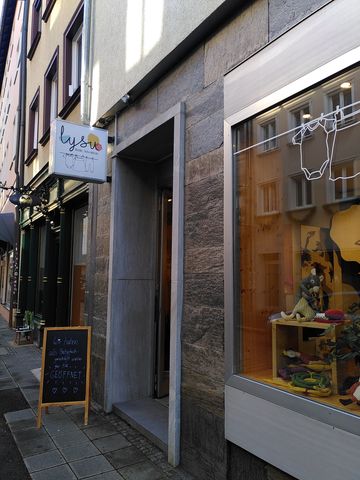
For children step by
Lysu, a cosy specialised shop offering fairly traded clothes, toys and accessories made from organic and natural materials for babies, toddlers, pre-school and elementary school kids. The shop is tucked away in Obere Wörthstraße, on the southern shore of the river Pegnitz, opposite the Trödelmarkt island. Like many other small shops also this one is closed on Mondays.
2021-10-12 13:00:00
[Nuremberg, organic, fashion, shoes, fair, vegan, bodycare, shopping, covid, corona]
Link

Sunday, 19 September 2021
On our summerly train travel from Munich to Trondheim, coming from Copenhagen, we had to reach the night-train in Malmö. Due to the pandemic we decided to buy provisions in Copenhagen and take an earlier regional train to Malmö, leaving us with the time for a stroll and a coffee break. And although I had not done any up-front research it turned out to be pretty easy to find a nice cafe serving at least partially organic food, just by keeping my eyes open. Having said this I am conviced that, with more than just one to two hours at hand, you will find many more places.
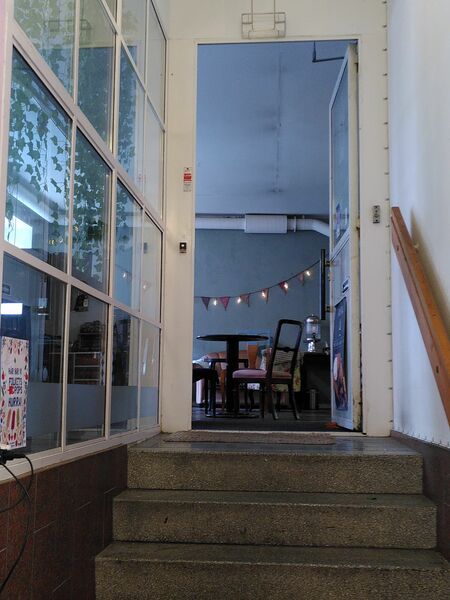
The first place I found was Café Holmgången in a narrow alleyway in the old part of the city, Gamla Staden, located between the Malmö C and Triangeln train stations.
The cafe itself was empty at this sunny afternoon during the week, offering raw cakes, some basic vegan lunch dishes and sandwiches, and also some outdoor tables, sheltered from rain by the passage. The service ensured me that most ingedients (though not all) were organic. We had an Italian-style espresso made with a proper pressure machine, and the cakes aside turned out to be surprisingly light and fluffy compared to other raw date-based cakes. The cafe itself is self-serviced, simply step inside, order and pay, and take the plates to the seat of your choice.
Proceeding west-bound to Davidshallsgatan we found a second, 100 percent vegan day cafe, Farm2Table, currently a bit invisible due to construction work in the street in front of it. Hadn't we bought provisions for the train already, we could have ordered them here: homemade sandwiches, bowls, smoothies, coffee drinks and Belgian waffles, predominantly made with organic ingredients.
And if you happen to need a new pair of sustainable jeans (or repair your old pair of this brand), a branch of the Swedish slow fashion chain
Nudie Jeans is just a few steps up the street.
2021-09-19 21:30:00
[Malmo, organic, fair, vegetarian, vegan, cafe, takeaway, coffee, snacks, lunch, fashion]
Link

Saturday, 18 September 2021
The idea was simple: Instead of flying – why not travelling climate-friendly? Most certainly this would take some time, but travelling Oslo–Berlin–Paris took time for the famous painters, writers and artists more than a hundred years ago, too.
Upfront research showed that it would have been possible to reach Trondheim within a little more than two nights and a day during the summer 2021, but we were restricted to travel in the first half of September by the date of a family festivity, limited days off from work and the end of the Bavarian school holidays. With only 10 minutes connecting time in Hamburg and, in case of a miss, the next possible connection one week later due to change of timetables on the Swedish part, we gave up on the plan of the fastest possible route. Instead two additional nights, one in Hamburg, and one in Copenhagen, would not only give us a little leisure to re-visit these cities, it would also increase the amount of money to spend: If you decide to travel Europe by train and do not have all the time of a university break a reasonably priced Interrail ticket simply won't suffice.
Finally the travel itinerary came up to
Altogether four nights and about three and a half days involving six train companies – most of them not co-operating. Had we had the time and money for a return trip it would even have been possible to take bicycles on the tour (at least to the Norwegian border).
Amidst the covid-19 pandemic a new privately held German train company took the courage to re-establish over-night travel by train on the North-South line through Germany, one part of the train departing from Salzburg, another from Konstanz by the lake Bodensee to be united on their way to the island of Sylt via (among others) Munich and Hamburg. The train is operated two times per week and tickets can be booked online only. The company informed by e-mail that the departure of the train wouldn't be visibly announced at the train station, but sent time, platform and car location for all stations on the route.
With this information at hand I didn't get nervous when the display at platform 6 in Munich Ostbahnhof announced that all trains would depart from platform 11 or 12 (presumably due to the strike of the Deutsche Bahn train drivers in the summer of 2021). Some fellow passengers found out that this also applied to the Alpen-Sylt-Express, and the entire crowd moved over.
What didn't show up in time was the train by the time of arrival and not even by the time of departure, and as announced, there simply was no information. A helpful staff member of the Austrian train company ÖBB reassured us that the train would arrive here, and finally it appeared on the platform display and, by about half an hour delayed, arrived.
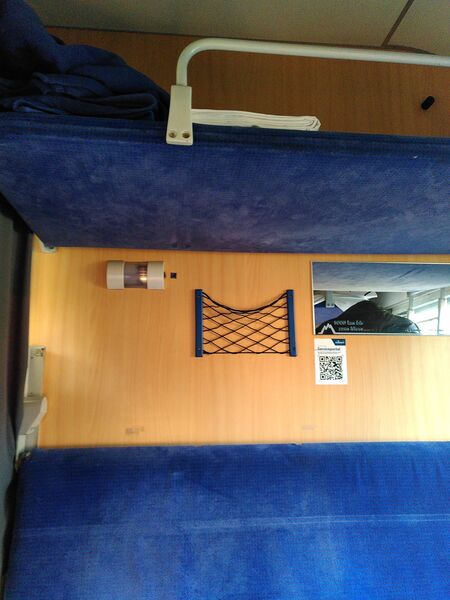
From now on everything went smooth (at least until we reached the Norwegian border). Due to the pandemic no strangers were booked into the former Deutsche Bahn couchette compartment which came at a price of 300 EUR for the two of us. The interior as well as the common wash and toilet facilities were clean, though a little worn. The almost doubly priced (or, in luxury class even more expensive) sleeper (with private room) is of French origin, and there's a very competitively priced seat car (starting at around 70 EUR).
On the train it would have been possible to order a pair of organic soft pretzls, organic tomato soup and organic porridge for dinner and breakfast, though no organic drinks.
Clean sheets were provided for all six sleeping places, and despite being a German train the proper way of sleeping was the Southern way wrapped into the sheet and covered with a blanket. Needless to add that in the couchette car you are expected to make your bed yourself. Complimentary drinking water to brush your teeth was not provided.
Danske Statsbanen (DSB) and Deutsche Bahn (DB) co-operatively run the city connection between Hamburg and Copenhagen via the Storebelt bridge, so buying tickets more or less spontaneously and without providing personal data, at a German or Danish train station usually shouldn't be an issue. The direct IC train runs four times a day to and fro and keeps waiting at the platform in Hamburg central station between arrival and departure. Unfortunately you aren't allowed on board more than fifteen minutes before departure – the train will be closed while the staff is having their break.
There are more connections where you have to change trains, but with almost all of them the journey takes around five hours.
The direct Intercity train is comfortable and – just as the night trains – has capacity for bicycles. Ticket prices vary, depending on whether you have a Bahncard discount card, as well as on how long in advance and where you buy it.
Effectively an urban train line over the Öresund bridge tickets for the Öresundtåg regional train can be bought from the ticket machines at København H – anonymously as long as you see away from the card payment which is the most comfortable payment method if your stay in Denmark isn't long enough to use Danish cash.
Since we travelled during the covid-19 pandemic passports had to be provided in the train which stopped but was closed during the border control.
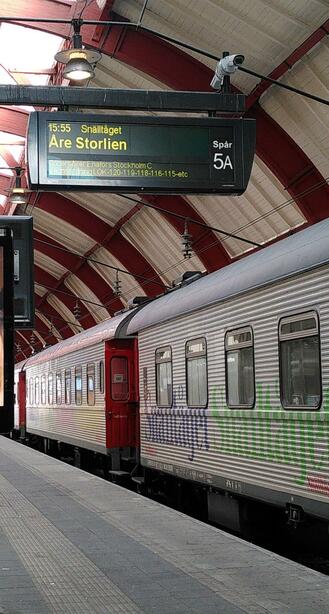
Malmö–Åre/Storlien on the Snälltåget night train
As far as I know night trains between Stockholm and the Swedish-Norwegian border at Storlien have been running for ages, and quite recently the privately held Snälltåget has extended its network to Berlin (via Copenhagen and Hamburg).
During the summer we could have travelled Munich–Berlin with Deutsche Bahn, with four hours the fastest train connection within Germany, and taken the Snälltåget from there, but as the Swedish company changed to their autumn timetable this connection did not work out.
The ticket for two in a private couchette came at 4000 SEK (about 400 EUR) and had to be booked on-line. Due to covid-19 restrictions the remaining four beds weren't filled up, but we were given all six complementary packs of drinking water. The choice at the restaurant car dubbed "Krogen" was limited due to the pandemic, and did not include any single organic item.
Washing facilities in the couchette car are limited to the common toilet.
The beds are a little wider than on the Alpen-Sylt-Express which might have been the reason for that my sleep was deeper and less disturbed during that night. On this train we were given duvet covers.
The train is provided at Malmö C in good time before departure, so we were able to board almost an hour before.
By the way: The train company's name, Snälltåget, is a play on words. The Swedish word "snäll" means "nice" and is a false friend with the German word "schnell" meaning "fast". Before IC and ICE trains took over the city connections in Germany, the then faster trains were referred to as "Schnellzüge", "fast trains".
Åre/Storlien–Trondheim: The last miles
What should have been a 1.5 hours train ride with the Meråkerbanen regional train
from the Snälltåget's final destination Storlien to Trondheim, turned out to be a show stopper for climate-friendly travel as well as a tedious money sink.
When planning the journey in June 2021, the timetables of Meråkerbanen were still on-line, although we expected a rail replacement bus service due to the ongoing electrification work on the route (just like on our last train journey from Stockholm to Storlien in 2017). What we did not expect was that there was no public transport service at all!
Locals told us that the connection has not been operated for the entire covid-19 pandemic, mainly because the Norwegian and the Swedish side wouldn't agree on the test and vaccine control procedure at the border.
So we had to hire a cab from one of the taxi companies in Åre: Taxi Åre did not have any cars left, but Topptaxi was willing to drive us from the train station of Åre over the border to the nearest Norwegian village, Meråker, at the hefty price tag of 2100 SEK. Due to an initial misunderstanding on behalf of the taxi operator we ended up paying only 1700 SEK for the 1.5 hours ride which would have been the price from Åre to the border. Given the fact that Storlien–Meråker would have been much shorter, this was probably a fair deal for both parties.
Since it was raining (the expected weather) we asked the taxi driver to drop us in front of the Coop Xtra hypermarket in Meråker where we could wait inside the "cafe" corner for the bus to Trondheim. A little more than an hour later we were heading over to the bus stop at Meraker school from where the bus no. 670 would take us to Trondheim. (Mind you that this 1.75 hours public bus service does not run on weekends.)
2021-09-18 16:30:01
[The_Conscious_Traveller, Germany, Denmark, Sweden, Norway, Salzburg, Munich, Konstanz, Hamburg, Berlin, Copenhagen, Malmo, Stockholm, Storlien, Aare, Trondheim, eco, nighttrains, trains]
Link

Monday, 13 September 2021
Ice-cream has never been as popular as during the covid-19 pandemic when ice-cream parlours started early in the season, and grown-ups ceased to preach that it was too cold to have one. (Although, in August 2021, I accidentally listened to the conversation between an ultra-thin insta-styled woman, presumably in her thirties, with her parents at their weekend get-together at a an ice-cream parlour in Bremen -- while temperatures were about 22 degree Celsius: Mother, deciding on a sundae: "Wouldn't you like to have an ice-cream, too?" Daughter: "Oh, no, thank you, it's too cold. I'll have a water.")
As the interest for quality local and organic produce has been increasing (too slowly, but significantly) I wasn't surprised to find a new organic ice-cream spot in the city of Leipzig, while filling the time between two trains with a stroll.
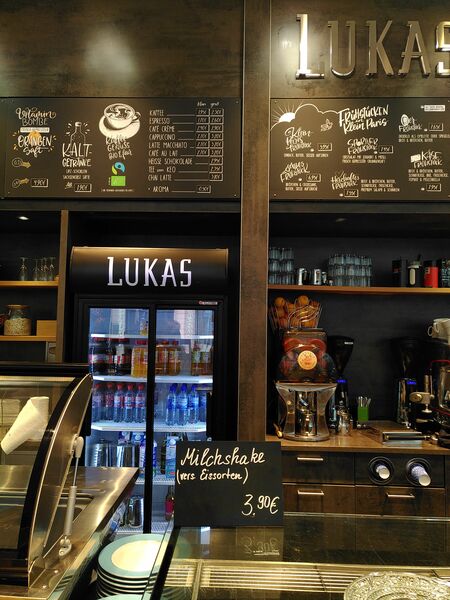
With more than 20 shops within the city boundaries the family-owned conventional bakery Lukas seems to be the largest bakery chain in Leipzig -- probably not the place you might look for organic ice-cream. But in May 2021 they started to produce twelve types of organic ice-cream at their branch at Bayrischer Platz. This must have proved to be a success since I found it at their cafe am Brühl, though only the four most basic flavours (vanilla, mango, chocolate and strawberry), at 1.20 EUR the scoop. The cafe also offers organic fairly-traded coffee (on the spot or in a Recup retour cup to take with you) and a small assortment of organic soft-drinks -- check for the "bio" label. Unfortunaltey th milk isn't organic. The cafe has quite liberal opening hours although I'm not sure whether you can buy an ice-cream at 7 o'clock in the morning.
Just around the corner from the Macis restaurant you'll find the city's organic ice-cream maker, Tonis. Unfortunately I was too late after dinner and could only watch them closing. They also have a second branch in famous Könneritzstraße.
More to try
As mentioned above my time in Leipzig was limited (as was my upfront research) -- but here are a few more tips, for you to try (and tell me if you like):
2021-09-13 16:00:00
[Leipzig, organic, ice-cream, cafe, coffee]
Link









